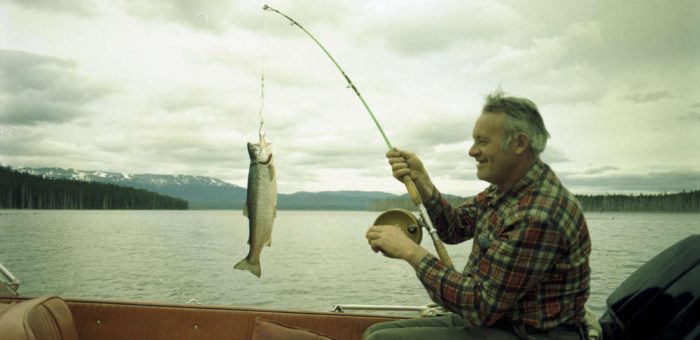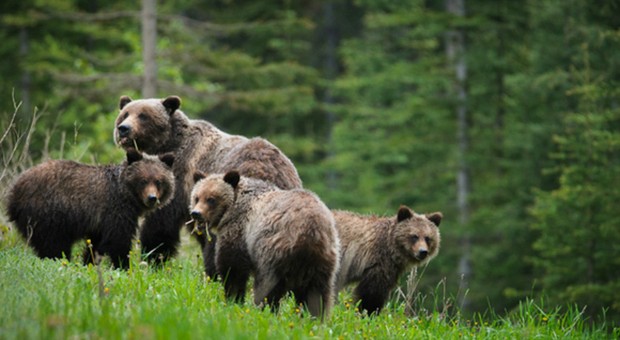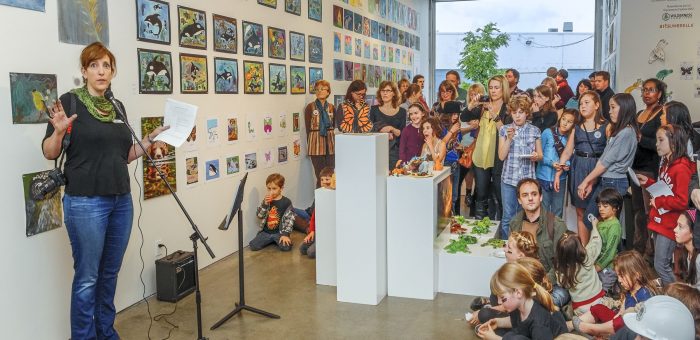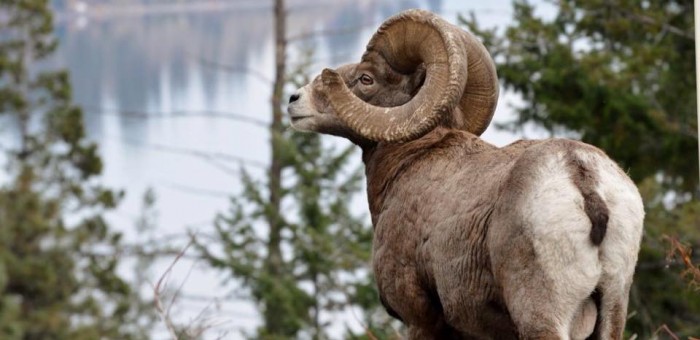Parks
Reintroducing Right to Roam Legislation in British Columbia
Today in the legislature I reintroduced the Right to Roam Act, a private members bill that I first introduced on February 27, 2017.
This bill was drafted in response to a number of conflicts in which people trying to hike or walk to rivers and lakes in the backcountry were met with new fences, gates, and threatened with arrest. When leased crown land or uncultivated private lands are blocking British Columbian’s ability to reach public lands and waterways, what are their rights in accessing those spaces?
The bill is a combination of B.C.’s existing Hunting and Fishing Heritage Act and Nova Scotia’s Angling Act and seeks to protect and clarify British Columbian’s right to access to crown and cross uncultivated wild lands. It does not increase access for any motorized vehicles, as this would be pose a significant risk to the landscape, wildlife populations, and historic First Nations sites. It does not amend any wildlife legislation or hunting regulations, nor does it limit the rights of property owners.
After its initial introduction, my office has received an endless stream of emails and phone calls from British Columbians who are struggling with this issue in their communities.
It’s clear that this right to access wilderness, especially on leased Crown land, is a debate that we need to have in British Columbia and that is precisely the reason why I felt it was important to reintroduce the bill. While I recognize that the government will unlikely call this bill for second reading, and while I also recognize that there are important amendments that would make it more effective, it’s critical that we keep this issue in the public realm.
I encourage all readers to contact their local MLA to emphasize the importance of bringing Right to Roam legislation to British Columbia.
Below I reproduce the video and text of the Bill’s introduction as well as the accompanying media release.
Video of Introduction
Text of Introduction
A. Weaver: I move that a bill intituled the Right to Roam Act, 2017 of which notice has been given in my name on the order paper be introduced and now read a first time.
The ability to access and experience nature is a right for all British Columbians, and we must protect it. Spending time outside is vital to our well-being, as well as the protection of our environment. The more time people spend in their local ecosystem, the more they will care about protecting it.
Increasingly, however, British Columbians are finding themselves fenced out of wild areas that have been enjoyed by the public for generations. Fences, gates and signs are blocking people from accessing Crown land.
Since the introduction of this bill for the first time last year, my office has literally received an endless stream of hundreds upon hundreds of emails and phone calls from British Columbians who are struggling with this issue in their communities.
It’s clear that this right to access wilderness, especially on leased Crown land, is a debate that we need to have in British Columbia.
At the recent UBCM conference, I also had delegations come to meet with me on this very topic, as well as local organizations and First Nations across British Columbia. It’s a pressing issue that’s effecting British Columbians from north to south to east to west.
This bill, which is built on a combination of B.C.’s existing Hunting and Fishing Heritage Act and Nova Scotia’s Angling Act would re-establish the rights of British Columbians to access public lands, rivers, streams and lakes and to use these spaces to fish, hike and enjoy outdoor recreation in accordance with the law.
Mr. Speaker: You have heard the question.
Motion approved.
A. Weaver: I move that the bill be placed on the orders of the day for second reading at the next sitting of the House after today.
Bill M209, Right to Roam Act, 2017, introduced, read a first time and ordered to be placed on orders of the day for second reading at the next sitting of the House after today.
Media Release
Weaver re-introduces bill to increase British Columbian’s access to nature
For immediate release
November 8, 2017
VICTORIA, B.C. – Andrew Weaver, leader of the B.C. Green Party, introduced a Private Member’s Bill that would increase the ability of British Columbians to access public lands. Weaver first introduced the bill, the Right to Roam Act, 2017, in February 2017 under the previous B.C. Liberal government.
“The ability to access and experience nature is a right for all British Columbians, and we must protect it,” said Weaver.
“Spending time outside is vital to our wellbeing, as well as the protection of our environment. The more time people spend in their local ecosystem, the more they will care about protecting it.
“Increasingly, however, British Columbians are finding themselves fenced out of wild areas that have been enjoyed by the public for generations. Fences, gates and signs are blocking people from accessing crown land.
“Since the introduction of this bill for the first time last year, my office has received an endless stream of emails and phone calls from British Columbians who are struggling with this issue in their communities. It is clear that the right to access wilderness, especially on leased crown land, is a debate we need to have in B.C.”
This Bill, which is built on a combination of B.C.’s existing Hunting and Fishing Heritage Act and Nova Scotia’s Angling Act, would re-establish the rights of British Columbians to access public lands, rivers, streams, and lakes, and to use these spaces to fish, hike and enjoy outdoor recreation in accordance with the law.”
-30-
Media contact
Jillian Oliver, Press Secretary
+1 778-650-0597 | jillian.oliver@leg.bc.ca
Political stunts and political spin — the confusing tale of the government’s inept grizzly bear policy
Today the BC NDP claimed to set the stage for banning trophy hunting of grizzly bears in British Columbia. In what can only be described as a political stunt, the BC NDP announced that “effective Nov. 30, 2017, the British Columbia government will end grizzly bear trophy hunting throughout the province.” They further proclaimed “while the trophy hunt will end, hunting for meat will be allowed to continue.”
In response to their announcement I issued a statement, reproduced below.
As you will see, I am very supportive of the fact that the B.C. NDP are respecting the wishes of the Coastal First Nations by placing a moratorium on the hunting of grizzlies in the Great Bear Rainforest. Readers of this website will know that I called for this back in February, 2014 (3 1/2 years ago). However, during the election campaign I pointed out that the B.C. NDP appeared to be trying to have their cake and eat it too when it came to the grizzly hunt. They told the hunting community one thing and the environmental community another.
Today’s announcement will not end grizzly bear hunting in B.C., as many environmental groups have advocated for.
In addition, this announcement will create a system in which not all of the animal will be harvested – resident hunters will no longer be allowed to possess the hair, head and hide of grizzlies. This will be viewed as wasteful by the resident hunting community.
Foreign hunters will still be able to shoot grizzlies in British Columbia, take a picture of themselves standing over the dead beast, and head back home without harvesting any of the animal.
What’s remarkable is that when I introduced legislation in the Spring of 2017 targeted at foreign trophy hunters the BC NDP did not support it. Now, they introduce a mishmash approach that makes little sense.
I’m not sure how this will appease the concerns of anyone. It appears to me that the NDP were trying to play to environmental voters in the election campaign without thinking through their policies. What we really need in BC is science-based approach to wildlife management, not a populist approach to species management.
Media Release
Weaver statement on government’s intention to end the grizzly bear trophy hunt
For immediate release
August 14, 2017
VICTORIA, B.C. – Andrew Weaver, leader of the B.C. Green caucus, responded to today’s news regarding grizzly bear hunting in British Columbia. Weaver has long advocated for action on this issue.
“I am encouraged that the B.C. NDP are respecting the wishes of the Coastal First Nations by placing a moratorium on the hunting of grizzlies in the Great Bear Rainforest,” says Weaver.
Weaver further cautions “During the election campaign I pointed out that the B.C. NDP appeared to be trying to have their cake and eat it too when it came to the grizzly hunt. They told the hunting community one thing and the environmental community another.”
Today’s announcement will not end grizzly bear hunting in B.C., as many environmental groups have advocated for.
In addition, this announcement will create a system in which not all of the animal will be harvested – resident hunters will no longer be allowed to possess the hair, head and hide of grizzlies. This will be viewed as wasteful by the resident hunting community.
In addition, foreign hunters will still be able to shoot grizzlies in British Columbia, take a picture of themselves standing over the dead beast, and head back home without harvesting any of the animal.
Weaver adds “I’m not sure how this will appease the concerns of anyone. It appears to me that the NDP were trying to play to environmental voters in the election campaign without thinking through their policies.
“What we really need in BC is science-based approach to wildlife management, not a populist approach to species management.
“B.C. is one of the last strongholds of grizzlies in North America. There are a range of issues that affect the health of grizzly bear populations. These include the effects of climate change on essential salmon and huckleberry stocks, as well as road kill rates and poaching incidents. We must focus on broader wildlife preservation if we are serious about conservation and the protection of grizzlies and other species in this province.
“B.C. and Alberta are the only provinces without Endangered Species legislation. I will work with the government to ensure the introduction of species at risk legislation is advanced in the near future,” says Weaver.
-30-
Media contact
Jillian Oliver, Press Secretary
+1 778-650-0597
jillian.oliver@leg.bc.ca
Thank you Gwen Barlee for your service to our province
 Claire Hume and I are very saddened to hear of Gwen Barlee’s passing. Gwen worked closely with us to help us draft an endangered species act during the spring, 2017 legislative sitting. We had no idea and she gave no indication that she was ill. Gwen was incredibly generous with her time and knowledge, patient and kind with her explanations, and tireless in her resolve to protect endangered species. We are so grateful. Thank you, Gwen, for your service to our province. We will think of you in the wilds of British Columbia and work towards the reintroduction of our Endangered Species Act in the near future.
Claire Hume and I are very saddened to hear of Gwen Barlee’s passing. Gwen worked closely with us to help us draft an endangered species act during the spring, 2017 legislative sitting. We had no idea and she gave no indication that she was ill. Gwen was incredibly generous with her time and knowledge, patient and kind with her explanations, and tireless in her resolve to protect endangered species. We are so grateful. Thank you, Gwen, for your service to our province. We will think of you in the wilds of British Columbia and work towards the reintroduction of our Endangered Species Act in the near future.
Standing up for Resident Hunters over Foreign Trophy Hunters
Today in the legislature I introduced Bill M234 — Wildlife Amendment Act, 2017.
This bill combined two previous bills that I had introduced in the legislature. The BC Liberals did not wish to bring either of these to second reading. The first Bill was to designed to reduce the preferential treatment of non-resident hunters by eliminating the minister’s discretion to make separate rules for resident and foreign hunters when it comes to obtaining LEH permits. This bill requires all hunters to enter a lottery for their LEH tags, as is done in other jurisdictions.
The second Bill I had already introduced was designed to ensure that all edible portions of animals hunted in British Columbia are taken to the hunter’s domicile. In addition, the proposed changes remove grizzly bears from the list of animals exempt from meat harvesting regulations. These put in place a major logistical barrier to foreign trophy hunting.
Two new additions were included in the updated bill. I am grateful to the feedback I received on my earlier bills that led to these modifications. First, if passed this bill would require that edible portions be packed out prior to, or in conjuction with, any other body parts of the game carcass. This is consistent with the notion is that hunting is primarily for food and the the trophy should be viewed as a by-catch.
The second addition would disallow those convicted of fisheries or wildlife offences from becoming fishing or hunting guides in the province of British Columbia.
Below I reproduce the text and video on my introduction along with the accompanying press release .
Text of the Introduction
A. Weaver: I move that a bill intituled Wildlife Amendment Act, 2017, of which notice has been given in my name on the order paper, be read a first time now.
Motion approved.
A. Weaver: It gives me great pleasure to introduce this bill that, if enacted, would make a number of changes to the Wildlife Act.
This bill restricts the practices of non-resident trophy hunters who come to B.C. to kill large game by making three specific amendments to the Wildlife Act. The proposed changes remove grizzly bears from the list of animals exempt from meat harvesting regulations, ensures all edible portions of animals killed in B.C. are taken directly to a hunter’s residence, and requires the meat to be taken out first, before the hide or head.
This bill also stops government from letting non-resident hunters buy preferential access to limited-entry hunting permits and bans people convicted of fisheries or wildlife offences from becoming fishing or hunting guides in the province of British Columbia.
For local sustenance hunters, the vast majority of hunters in B.C. that is, this bill merely echoes what they are already doing — harvesting wild game to bring the meat home to feed their families. For non-resident trophy hunters coming to B.C. to hunt an animal only for its hide, skull or antler, this bill puts in place a significant logistical challenge.
Bill M234, Wildlife Amendment Act, 2017, introduced and read a first time.
A. Weaver: At this time, I move, pursuant to standing order 78a, that this bill be referred to the Select Standing Committee on Parliamentary Reform, Ethical Conduct, Standing Orders and Private Bills for immediate review.
Madame Speaker: I will point out that that’s a departure in practice.
All those in favour? Nay is heard. Division has been called.
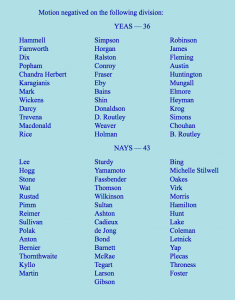 A. Weaver: May I have this referred to second reading — a motion to do so?
A. Weaver: May I have this referred to second reading — a motion to do so?
Bill M234, Wildlife Amendment Act, ordered to be placed on orders of the day for second reading at the next sitting of the House after today.
Video of the Introduction
Media Release
Weaver tables Wildlife Amendment Act to Committee Stage – Liberals vote Nay
For immediate release
March 6th, 2017
VICTORIA B.C. – Today in the legislature MLA Andrew Weaver tabled the Wildlife Amendment Act directly to committee stage, leading to an immediate vote in the House. Weaver and the B.C. NDP voted in favour of moving the bill directly to committee stage for review. The B.C. Liberals voted against it.
“This bill works to ensure that sustainable, respectful sustenance hunting in British Columbia is grounded in a science-based conservation policy and that the interests of residents hunters are put ahead of foreign trophy hunters.
“It is clear these are values the B.C. Liberals do not share – as illustrated by their vote against further consulting on this bill today. But, I am glad to see that the B.C. NDP support my initiatives on this file,” says Weaver.
The bill would restrict the practices of non-resident trophy hunters who come to B.C. to hunt large game by making three specific amendments to the Wildlife Act. The proposed changes remove grizzly bears from the list of animals exempt from meat harvesting regulations, ensures all edible portions of animals killed in B.C. are taken directly to the hunter’s residence, and requires the meat to be taken out first – before the hide or head. For non-resident trophy hunters coming to B.C. to hunt an animal solely for its hide, skull, or antlers this puts in place a prohibitive logistical challenge.
The bill also stops the government from letting non-resident hunters buy preferential access to limited-entry-hunt permits. And lastly, it bans people convicted of fisheries or wildlife offenses in B.C. and other jurisdictions from becoming fishing or hunting guides.
– 30 –
Media contact
Mat Wright, Press Secretary
+1 250-216-3382 | mat.wright@leg.bc.ca
Introducing Right to Roam legislation in British Columbia
Today in the legislature I introduced a private member’s bill entitled Bill M223 — Right to Roam Act. This Bill reestablishes the rights of British Columbians to access public lands, rivers, streams, and lakes, and to use these spaces to fish, hike and enjoy outdoor recreation.
Increasingly, British Columbians are being fenced out of wild areas that have been enjoyed by the public for generations. One particularly high profile example involves public access to Minnie, Stoney and other lakes surrounded by Douglas Lake Ranch spread out over more than 500,000 acres. Approximately 365,000 acres are already crown land with full public access. But concern over access to several lakes was raised when Stoney Lake Road was suddenly gated in the late 1970s and subsequently locked in the early 1980s.
Below I reproduce the text and video of the speech I gave as I introduced the bill. I also include the accompanying media release.
Text of my Introduction
A. Weaver: I move that a bill intituled the Right to Roam Act, 2017, of which notice has been given, be introduced and read a first time now.
Motion approved.
A. Weaver: I’m pleased to be introducing a bill intituled the Right to Roam Act, 2017.
The ability to access and experience nature is a right for all British Columbians, and we must protect it. This bill will re-establish the rights of British Columbians to access public lands, rivers, streams and lakes and to use these spaces to fish, hike and enjoy outdoor recreation.
Hunting, fishing and outdoor recreation are a pivotal part of British Columbia’s heritage and form an important part of the fabric of present-day life in British Columbia. They are also vital to the understanding, conservation and management of fish and wildlife in our province.
Increasingly, however, British Columbians are being fenced out of wild areas that have been enjoyed by the public for generations.
One particularly high profile example involved public access to Minnie, Stoney and other lakes surrounded by Douglas Lake Ranch, spread out over more than 500,000 acres. Public access was prevented when Stoney Lake Road was suddenly gated in the 1970s and subsequently locked in the 1980s. This bill, which is built on a combination of B.C.’s existing Hunting and Fishing Heritage Act and Nova Scotia’s Angling Act, aims to address and prevent such conflicts.
I move that the bill be placed on the orders of the day for second reading at the next sitting of the House after today.
Bill M223, Right to Roam Act, 2017, introduced, read a first time and ordered to be placed on orders of the day for second reading at the next sitting of the House after today.
Video of my Introduction
Media Release
Weaver introduces Right to Roam Act
For immediate release
February 27th, 2017
VICTORIA B.C. – Locked gates on back roads are increasingly restricting access to wild lands in the province, making it harder for outdoors people to go hunting, fishing or hiking. A new bill tabled Monday by Andrew Weaver, Leader of the B.C. Green Party, would put a stop to that practice.
“British Columbians are increasingly being fenced out of the province’s wild lands. The ability to access and experience nature is a public right, and we must protect it,” says Weaver, who is the MLA for Oak Bay-Gordon Head. “Free public access to the outdoors is vital to people’s health and well-being, but it is also vital to the health and well-being of our environment. People protect what they know and love. If we become disconnected from our environment we risk disengaging with the fight for its future.”
In many regions of the province, the only way to access wild Crown lands is via logging roads, public back roads, or across privately owned forests and uncultivated areas. While casual public use of these accessways has not been an issue in the past, there is a growing trend of neighbouring landowners and forestry companies locking people out. Some are building fences and installing locked gates to block access altogether, others are implementing strict schedules or access fees. In extreme cases, British Columbians are getting arrested for trespassing while walking to public lakes they have been fishing for generations.
The Nicola Valley Fish and Game Club, a non-profit association dedicated to the local preservation and management of habitat and wildlife, for example, has spent years in a legal battle with the owner of the Douglas Lake Ranch over the public right to fish in public lakes..
“The Right to Roam Act aims to address and prevent conflicts like the Douglas Lake Ranch case. Nature in British Columbia should be open to all, not to just the privileged few,” says Weaver.
This Act was built off the existing BC Hunting and Fishing Heritage Act and the Nova Scotia Angling Act. It includes a few additional amendments, made with reference to a UVic Environmental Law Clinic report about enhancing public access to wild lands.
“By allowing people to cross uncultivated wild land to access public lands, rivers, streams, and lakes, the Right to Roam Act aims to re-establish the rights of British Columbians and to use these spaces to fish, hike and enjoy outdoor recreation.”
– 30 –
Media contact
Mat Wright, Press Secretary
+1 250-216-3382 | mat.wright@leg.bc.ca

